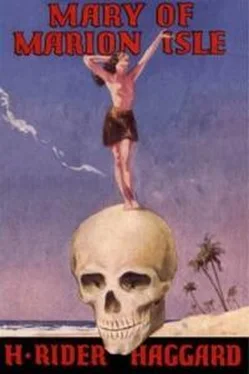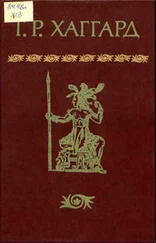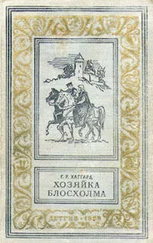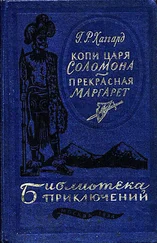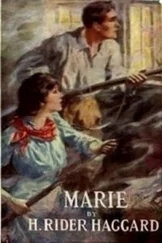"Then why on earth did you go tying tin plates to albatrosses?" she inquired with irritation.
"For the sake of the lady yonder, if you want to know. The position was growing difficult."
"So I gather—overwhelmingly difficult. By the way, that child is painfully like you, and some one else," she added with another little wince. "It would have been far better to face the inevitable at once, but you were always foolishly fond of half–measures, Andrew."
"At any rate I have conquered the weakness now, Clara. Go away and lead your own life and leave me to lead mine."
"It is impossible, Andrew. There are too many witnesses, the whole shipload of them, for these people have tongues in their heads, to say nothing of the camera which that donkey of a naval officer carries about with him. Look here, by all means let us make a bargain. The child is not years, but the other man's, as to the exact date of whose decease no inquiries need be made. You befriended the helpless people whom you found starving on an island, that is all. But subsequently the husband died. Well, we all go to England and the pretty savage vanishes—where to I shall not trouble myself to inquire, for, as I have said, I am not straitlaced. West House is large enough for both of us and if you care to keep on your rooms in Justice Street as well, that is no affair of mine," she added with emphasis.
"I think that Mary would soon die in Justice Street, and the child also. The change would be too drastic. Also the idea of leading a double life does not appeal to me."
"Am I to understand that it is your intention to stay in this God–forsaken place, Andrew?"
"Certainly. I like it better than London."
"You mean that you like your savage woman better than you do me? At any rate it is not complimentary of you to say so so plainly."
"I never said anything of the sort, but as politeness is in question it is not complimentary of you to call that lady a savage woman. Look here, Clara, since our child's death we have practically lived apart and I propose that we should continue to do so, especially now when I have another child. My fate does not seem to have disturbed you until the matter got into the papers; indeed, you tell me that you were on the point of marrying again. This you can still do if you wish, since, as you know well, you can take your remedy against me."
For a while they looked at each other and, after her fashion, Clara coolly summed up the situation in her mind. Evidently Andrew was much altered. Hitherto she had always been able to get her own way with him, but now this seemed more difficult. Something, or some one, had brought about a change in him. However, she did not despair; perhaps in a day or two he would see matters differently.
"You are mad, Andrew," she said, "but I make allowances for you, because such a life as you have been leading during all these years does not tend to sanity. To–morrow, or soon, you may take another point of view, so let us drop this very unpleasant conversation for the present. It can always be resumed. Meanwhile, don't you think you had better wash your hands, that is if you do wash in this place? As I am here I shall take a little walk and study your interesting surroundings," and without waiting for an answer she went back to the caves.
Andrew, overcome with misery, stopped where he was, lost in thought and wondering what would be the end of it all. Then he looked at his stained hands, hardened with toil, and reflected that he would take Clara's advice and wash before he confronted that naval officer and the others. So he went to a certain sheltered spot on the shore of the bay and more to consume time than for any other reason, stripped himself, after all a simple process, and swam in the pool, after which he set to work to clean the spots off his sealskin robe, rubbing them with sand and seaweed.
Meanwhile Clara had reached the caves, where she found Mary still going about her tasks in a dazed way, the little girl Janet clinging to her robe, while the manservant studied the penguins and the young naval officer studied Mary with the most evident admiration. Clara went to Mary and said:
"Can you speak English?"
"Yes," answered Mary. "Where is Andrew? I must go to him."
"I think that he is washing and will be here presently. Can you give me some water to drink? I am thirsty."
"I have milk in the cave," said Mary, and went for it, followed by Clara, who was curious to see the place that was inhabited by this beautiful person clad in sealskins and a discoloured pearl necklace. Also she wished to study Mary, who, she noted at once, was no common woman; indeed, had she been so she knew well that Andrew would never have cared for her. Her whole bearing, to say nothing of that pearl necklace, told another tale.
Inside the cave Mary gave her goat's milk in a fine shell, while Clara, seated on a stone near the fire, looked about her curiously.
"May I talk with you a little?" she said presently in her most winning voice, "It seems best that we should understand each other."
Mary, standing before her, bowed her head.
"You are fond of my husband," Clara went on.
Again Mary bowed her head and answered:
"Yes. Does not this show it?" and she touched Janet.
Clara shrugged her shoulders, and went on, "I do not wish to be hard, but you know you are living with him in sin, do you not?"
"No," answered Mary, "my heart does not tell me that. My heart tells me that it is right to live with him. You left him to drown upon the ship, but I saved him when he was dying and God gave him to me."
"Let us leave God out of it and all the rest, too. Do you know that you are ruining him?"
"Ruining. What is that?"
"This. Although he may never have told you so, he is a great man. His name is Lord Atterton. He is very wealthy, that is to say he commands large fortunes. Also he is, or would be, the Governor, I mean the head officer under the Crown, of an important part of the British Empire. He was going out to take up that office when he was wrecked, and it is now waiting for him again. Well, in England we are what is called moral people, that is to say there must be no open talk about any man living with a woman to whom he has not been married in church. If there is such talk, then he is ruined. I mean that no one would speak to him, and that he can hold no public office. He is finished. Do you understand me?"
"Yes, I think that I understand. You mean that if Andrew and I and Janet go on living together, then people will spit at him, and he will be what you call ruined."
"Yes, I mean that. You must make him separate from you, though perhaps," Clara added, watching her, "you might sometimes see him afterwards."
"Separate—that is leave me, is it not? Well, Andrew, he will never do that. You see, there is this strange thing, that he love this poor wild Mary. Yes, I who lose everything have this that he love me to–day, to–morrow, always," here her breast heaved and her eyes flashed, "that he love me for ever and ever, much while I live and more when I dead, that he love me as he never love anything else, or any other woman, not even one called Rose, except perhaps a little Janet who is gone and a little Janet here who is part of me."
"I dare say all this may or may not be true," began Clara, with a chilly smile, but waving her hand imperiously, Mary stopped her.
"There is only one bigger thing than Andrew's love for Mary, and that is Mary's love for Andrew. She love him so well that never, never will she ruin him, she who can wait wherever she go, till he come to find her, which will not be very long."
Now Clara looked at Mary and Mary looked at Clara, who of a sudden understood.
This woman means to kill herself, she reflected. Shall I stop it? No, what affair is it of mine? She must form her own judgment on such a matter. I am not responsible, and if she does vanish it will simplify things. Also I dare say she is merely acting.
Читать дальше
Конец ознакомительного отрывка
Купить книгу
